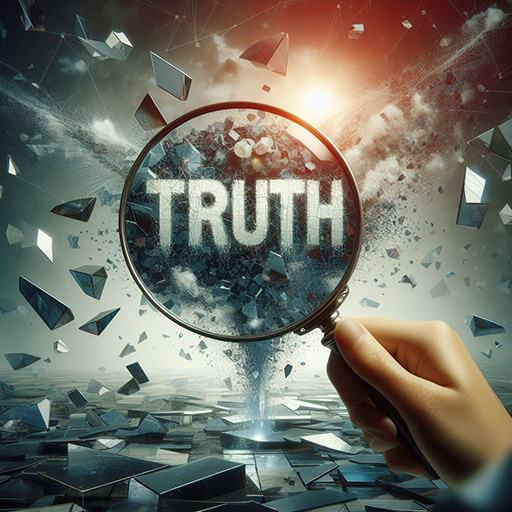Unveiling Reality: Embarking on an Intellectual Journey to Uncover Truth
In our modern age, where facts often mingle with fiction in the vast expanse of the internet, the quest for truth has never been more vital. From the confines of academia to the bustling realms of social media, we are bombarded with competing narratives and conflicting perspectives. In such a landscape, the search for truth becomes not merely a philosophical endeavor but a practical necessity.
Epistemology, the study of knowledge and belief, is our guiding compass. It explores questions such as: What is knowledge? How do we acquire it? And how can we distinguish between true beliefs and mere opinions? By delving into the nature of knowledge, we gain insights illuminating the path ahead.
Join me as we unravel the complexities of truth-seeking in the digital age, exploring the nuances of perception, the pursuit of knowledge, and the daunting challenge of navigating the sea of disinformation. Together, we will embark on an odyssey of epistemological exploration, seeking to illuminate the shadows of uncertainty with the beacon of inquiry.
Let the journey begin.
Unraveling the Tapestry of Perception and Truth
Our quest begins with exploring perception and its role in shaping our understanding of reality. Everyone perceives the world through their own unique lens, colored by experiences, beliefs, and biases. Another may question what appears true to one, leading to a kaleidoscope of interpretations.
Consider the age-old question: “If a tree falls in a forest and no one is around to hear it, does it make a sound?” This philosophical quandary highlights the subjective nature of truth. While some argue that sound exists independently of observation, others posit that without a listener, the vibrations in the air remain mere potentialities.
In our search for truth, we must first acknowledge the limitations of our perception. Our senses give us a window into reality but are not infallible. Optical illusions, auditory hallucinations, and cognitive biases remind us that our perceptions may not always align with objective reality.
Moreover, our cultural backgrounds and personal experiences shape how we interpret the world. What may seem self-evident to one person may be incomprehensible to another, underscoring the subjective nature of truth.
By recognizing the influence of our subjective experiences, we can peel back the layers of bias and approach reality with greater clarity. Through introspection and empathy, we can strive to understand alternative perspectives and bridge the gap between differing interpretations.
In unraveling the tapestry of perception, we embark on a journey of self-discovery, challenging our preconceptions and expanding our understanding of the world. Let us embrace the complexities of perception as we navigate the winding path toward truth.
The Pursuit of Knowledge and Truth
With understanding of how our perception is affected, we delve deeper into the pursuit of knowledge. From the ancient philosophers of Greece to the modern scientists of today, humanity has ceaselessly sought to unravel the mysteries of the universe.
Throughout history, various methods of inquiry have been employed in the quest for truth. From deductive reasoning to empirical observation, each approach offers unique insights into the nature of reality. Philosophers like Aristotle and Descartes laid the groundwork for logical reasoning. At the same time, pioneers like Galileo and Newton revolutionized our understanding of the physical world through experimentation and observation.
Yet, despite our best efforts, absolute certainty remains elusive, and our understanding of truth is ever-evolving. The scientific method, emphasizing hypothesis testing and peer review, is a testament to our willingness to challenge established truths in pursuit of deeper understanding.
As we journey through academia and exploration, let us embrace the uncertainty inherent in pursuing truth. For it is through questioning and curiosity that we inch closer to enlightenment.
In the digital age, access to information has never been easier, yet discerning truth from falsehood remains daunting. The proliferation of misinformation and social media echo chambers pose significant challenges to our quest for knowledge. Yet, with diligence and critical thinking, we can navigate this sea of uncertainty and emerge with a deeper understanding of the world.
Navigating the Sea of Disinformation
In an age of information overload, discerning truth from falsehood can feel like navigating a treacherous sea. From fake news to conspiracy theories, the digital landscape is fraught with misinformation, threatening to distort our understanding of reality.
Social media’s rise has transformed how information is disseminated and consumed, creating echo chambers where falsehoods are amplified and dissenting voices are silenced. Algorithms designed to maximize engagement often prioritize sensationalism over accuracy, leading to clickbait headlines and misleading content proliferation.
Critical thinking becomes our most potent weapon against deception in such an environment. By honing our ability to evaluate sources, cross-reference information, and think skeptically, we can confidently navigate the sea of disinformation.
Fact-checking websites and media literacy programs are crucial in equipping individuals with the tools to separate fact from fiction. By empowering citizens to question the information they encounter and seek out credible sources, we can mitigate the spread of falsehoods and foster a more informed society.
Moreover, fostering a culture of transparency and accountability among media outlets and online platforms is essential in combating the spread of disinformation. We can create a more trustworthy information ecosystem by holding purveyors of falsehoods accountable for their actions and promoting ethical journalism practices.
Conclusion
We embark on a perpetual odyssey in our quest for truth, navigating the labyrinth of perception, knowledge, and disinformation. Through introspection and inquiry, we strive to unravel the mysteries of the universe and gain a deeper understanding of ourselves and the world around us.
As fellow truth-seekers, I invite you to join the conversation. Like, share, or comment below to share your thoughts and insights on pursuing truth. Together, let us embark on this epistemological odyssey and uncover the truths that lie beyond the horizon.
Let us embrace the complexities of perception and the challenges of discerning truth in the digital age. With curiosity, critical thinking, and a commitment to intellectual honesty, we can navigate the sea of disinformation and emerge with a clearer understanding of the world.
As we continue our journey, let us remember that the pursuit of truth is not merely a destination but a lifelong endeavor. We can forge a path toward enlightenment through collaboration and dialogue and empower future generations to seek truth in an ever-changing world.
Let the journey continue.
Check out more great articles here!
Read more about epistemology and the modern media here.
*If you enjoy this article, please give us a like below, share it on social media, and leave a comment with your thoughts. It really helps the blog. 😊






Leave a Reply